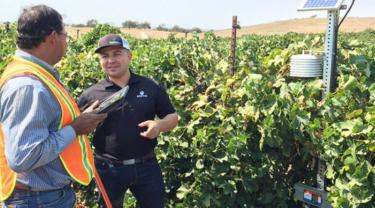Right from the outset, Jocelyn Boudreau knew that the technology his company was developing would be primarily for export.
Founded in 2002, Lévis, Québec-based Hortau is a leader in precision irrigation management systems for agriculture. The company’s patented irrigation management, automation and weather monitoring systems help growers manage crop stress in real time using soil tension, which ensures optimal production while reducing water use, energy consumption and environmental impact.
“Exporting was part of our plan right from the start,” says Boudreau, CEO and co-founder of Hortau along with Jean Caron. “As we evaluated different business models and paths to success for our technologies, it was always clear that we had to target export markets and create success in specific geographies and use them as launch pads to expand.”
With a U.S. head office in San Luis Obispo, California and customers in several other states, the U.S. is currently the company’s main focus for exports, which account for 90 per cent of sales, but new opportunities are being evaluated in South America, Australia, South Africa and the Mediterranean region, adds Boudreau.
Hortau’s expertise is part of a growing global move toward technology to enhance agricultural production and farming efficiency. Earlier this year, the company was one of three finalists in the Best Artificial Intelligence Product in Agriculture category at the CognitionX awards event in London, England.
Hortau was also named to the THRIVE AgTech Top 50 Growth companies list, a global list of the top 50 companies shaping the future of agriculture, and to Global Cleantech’s Top 100 Companies to Watch list by the Cleantech Group, which recognizes companies that are best positioned to solve tomorrow’s clean technology challenges and have the greatest impact on the market.
Hortau’s breakthrough into the export market came after the company had established a name for itself among cranberry farmers in Québec.
“Wisconsin in the U.S. has a similar cranberry industry and we soon realized that there was an opportunity for us to duplicate what we were doing in Québec,” says Boudreau. “We’ve been active in that region ever since.”
But California has been the company’s most promising area for growth, so much so that Boudreau moved to the state with his family four years ago to oversee expansion.
“Our success has been based on a mix of technology itself and our go-to-market strategy,” he says. “I moved here to be closer to the market, which allows us to leverage our technology and adapt quickly to market conditions, building on our success and learning from our failures. We’ve innovated not only with our technology, but also with our business model.”
Boudreau says it didn’t take the company long after starting to export to learn how important it is to understand the market, not only from its customers’ perspective, but also the political and economic environment in which they farmed.
For example, it was important to understand the economic pressures facing farmers in California’s agriculturally robust San Joaquin Valley where water prices have reached historic highs and cutting water costs are upper most in their minds.
Hortau’s products address this need by allowing farmers to determine the precise amount of water required for a particular crop or orchard.
“Knowing exactly how thirsty plants are and providing them with just the right dose of moisture can lead to better plant health, increased yields, and lower irrigation costs, and that’s what our technology can do,” says Boudreau.
Export insights with CEO Jocelyn Boudreau
What was your biggest challenge when first starting to export?
Understanding the market with enough depth to allow us to adapt our products to the market reality and customer needs. We chose to be present, get closer to our market and customers to really immerse ourselves in the local reality and adapt quickly. This turned out to be a key element of our initial success and remains a key factor today. We’re pioneering a new industry and there’s no roadmap for us to use as guidance.
What do you know now that you wish you knew when you first started exporting?
We’ve learned to start with the end in mind. When we define and develop new services, we start with our markets and customers in mind. We define the business model that will support our go-to-market strategy, the technical support needed and so on.
What’s the most important thing SMEs entering the export market need to know?
Understand the market – the players involved and the business and political environment in the target country. Learn fast and adapt quickly. It’s nearly impossible to figure everything out before the start. Adaptability and resilience are key.
To learn more about export opportunities in agricultural technology, please read How agricultural technology will help unleash Canada’s export potential.





